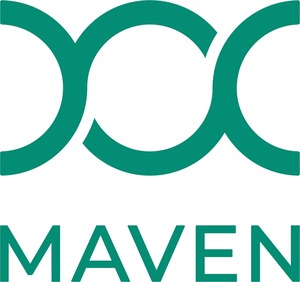New clinical research highlights the power of digital health in reducing unnecessary C-sections and addressing social determinants of health
NEW YORK, Feb. 28, 2023 /PRNewswire/ -- Maven Clinic, the world's largest virtual clinic for women's and family health, today announced several clinical innovation milestones, including publishing results from two new peer-reviewed studies and appointing its next Visiting Scientist to deepen insights into perinatal mental health. These advancements demonstrate how Maven is redesigning the care model for women's and family health, centering the needs of members while driving down healthcare spend for its partners.
"To deliver on its promise, digital health must provide more than an improved user experience — it has to impact the generational problems of healthcare, including inequity and high costs," said Kate Ryder, founder and CEO of Maven Clinic. "Maven's platform has a strong clinical foundation that is delivering industry-leading results for our partners on the issues that matter most."
Maven's latest research reinforces the effectiveness of the company's care model to detect social determinants of health and to lower C-section rates, among other clinical outcomes. The research includes:
- Digital care coordination and education reduces unnecessary C-section rates:
Reducing unnecessary C-sections improves maternal and infant health outcomes while decreasing healthcare costs for employers and health plans. Although vaginal birth after C-section (VBAC) is considered safer than a repeat C-section, only 30-40% of people choose to labor in their subsequent birth after having a C-section. Maven's study, published in the Journal of Midwifery & Women's Health, found that digital health services can help to overcome key barriers and increase VBAC rates. In fact, Maven members who have had a prior C-section and met with a Maven Care Advocate at least once were 6x more likely to have a vaginal birth after a C-section.
- A short-form digital social determinants of health (SDOH) screening tool reduces barriers to identifying and addressing social needs: Studies suggest that 30-55% of health outcomes can be attributed to SDOH, though many SDOH screeners are long and burdensome to complete, and therefore seldom administered. Maven developed a novel, three-question SDOH screening tool that takes less than one minute to complete and can be delivered digitally. Peer-reviewed and published as an open access resource in the American Journal of Obstetrics and Gynecology, the tool performs close to par with the current gold standard of SDOH screening. As part of testing the screening tool, Maven also conducted a survey of 200 pregnant and postpartum people about their social needs. The survey found 75% had at least one material or social need, and 80% felt comfortable with receiving support for their needs by app, text, or in conversation with a medical or non-medical healthcare worker. The data suggests digital platforms like Maven are well positioned to identify and address SDOH.
Maven's family-building programs reduce costs for employers and health plans, while bringing together clinical, emotional and financial support to improve health and business outcomes for its members. The company's care model has demonstrated that it has lowered C-section rates by up to 20%, reduced NICU (neonatal intensive care unit) admissions by up to 28%, and helped as many as 25% of its fertility members to achieve pregnancy without assisted reproductive technology. Maven's ROI calculation methodology for its maternity and fertility programs was independently reviewed and validated by Milliman, Inc., as described in the associated reports (maternity, fertility).
"Digital care models have as much potential to impact people's health as drugs or devices, and should be developed with a high standard of scientific rigor," said Dr. Neel Shah, Chief Medical Officer of Maven Clinic. "Maven has built evidence-based programs that close critical gaps in access to services while measuring and publicly reporting our work."
In addition to announcing new research, Maven has welcomed a new clinician innovator, Dr. Constance Guille, Professor in the Department of Psychiatry and Behavioral Sciences and Obstetrics and Gynecology at Medical University of South Carolina, as its second Visiting Scientist. In this role, Dr. Guille will bring her expertise as a reproductive psychiatrist to help advance Maven's clinical research roadmap and provide strategic input on care model design, with a focus on mental health.
"Having seen the devastating effects of unrecognized and untreated maternal mental health disorders, I believe there is a tremendous need and promise for using digital health to integrate patient-centered maternal behavioral health treatment into routine prenatal care," said Dr. Guille. "I am excited to share my insights with Maven to further advance the company's maternal mental health care model."
About Maven Clinic
Maven is the largest virtual clinic for women's and family health, offering continuous, holistic care for fertility and family building through maternity, parenting, pediatrics and menopause. Maven's award-winning digital programs are trusted by leading employers and health plans to reduce costs and drive better maternal health outcomes, as well as enhance DE&I in benefits programs. Founded in 2014 by CEO Kate Ryder, Maven has been recognized as Fast Company's #1 Most Innovative Health Company and has 15 million lives under management. Maven has raised $300 million in funding from leading investors including General Catalyst, Sequoia, Oak HC/FT, Dragoneer Investment Group and Lux Capital. To learn more about Maven, visit us at mavenclinic.com.
SOURCE Maven Clinic

WANT YOUR COMPANY'S NEWS FEATURED ON PRNEWSWIRE.COM?
Newsrooms &
Influencers
Digital Media
Outlets
Journalists
Opted In





Share this article